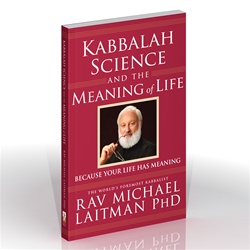Now You Can Understand What the Bible Is Really About
Kabbalists, as previously mentioned, research the Upper World, the world beyond the perception of an ordinary person. Hence, the depictions of Kabbalists’ attainments relate to the Upper World, but because we are not aware of the existence of a spiritual world besides our own, we ascribe their words to our world, a phenomenon called “materialization.”
When the Torah (Five Books of Moses) was written, the people of Israel were at a spiritual degree. But after two thousand years of detachment from spirituality since the ruin of the Second Temple, the Torah stories seem to refer to historic episodes or moral conduct.
Yet, this is not the case. Each element in the world is connected to the same element in all the other worlds by a “root and branch” connection. Based on that principle, Kabbalists developed a language that relies on the parallelism between the Upper Worlds and our own world. In it, processes unfolding in the spiritual world are described using names of branches taken from our world.
Introducing the 4 Languages of Kabbalah
Kabbalists use four different languages to explain how we can reach the degree of the Creator and how we can draw to ourselves the Correcting Force that will invert our nature from egoism to altruism. These languages are the language of the Bible, the language of laws, the language of legends, and the language of Kabbalah.
In his essay, The Wisdom of Kabbalah and its Essence, Baal HaSulam wrote that there are four languages in the wisdom of truth, and the essence of the wisdom of Kabbalah is no different than the essence of the Bible. However, the laws, the legends, and the language of Kabbalah are the most convenient and appropriate to use.
The difference among the languages is in their accuracy. The language of Kabbalah is more precise in depicting the connection between the root in the Upper World and the branch in the lower world. The more accurately one connects oneself to one’s Upper Root, the greater Correcting Force one receives.
What Is the Best Kabbalah Book for People Living Today?
The language of Kabbalah applies to terms that do not exist in our world, such as “worlds” and “Sefirot,” charts and formulae. This language makes it easier to avoid confusion and materialization, and facilitates a clear and ordered approach to the study. The language of Kabbalah is essentially different from other languages because of the clear, unequivocal way it describes the purpose of Creation—the similarity of the creature to the Creator, i.e. inversion of egoism into altruism.
The chief Kabbalah textbook at present is Baal HaSulam’s six-volume Talmud Eser Sefirot(The Study of the Ten Sefirot), based on the writings of the Ari. In just over 2,000 pages, Talmud Eser Sefirot expounds on the structure of the Upper Worlds, accompanied by charts, glossaries, and tables of questions and answers for revision of the material. In the introduction to the book, Baal HaSulam elaborates on the reasons for preferring the language of Kabbalah to the other languages in our generation.
Today, humanity has come to the last phase in the evolution of the will to receive. This is why Baal HaSulam adapted the method of the Ari to the structure of the souls in our generation–to make it accessible for everyone.
Why Kabbalah Is Not a Religion
Many people mistakenly relate the wisdom of Kabbalah to the Jewish religion. In truth, Kabbalah and religion are fundamentally different. The purpose of religion is to calm people down; it nurtures the hope that if I pray, the Creator’s attitude toward me will change.
Kabbalah takes a very different approach: The root of the word “prayer” (Hebrew: Tefila) means “sentencing,” or “judging” (Hebrew: Palal). In other words, one sentences oneself, examines the difference in quality between oneself and the Creator, and asks to receive strength to correct one’s own attributes.
The wisdom of Kabbalah explains that the Creator is unchanging. His attitude toward His creatures is categorical—He is good and does good to both the good and the bad.
Everyone feels the constant pressure of the Upper Force according to his or her distance from It. When one is far from the Upper Force, the pressure is heavy, and when one comes nearer to the Upper Force, the pressure eases.
How Kabbalah Changes a Person’s Life for the Better
Although the Upper Force engages diverse means to draw us near It, Its purpose is always the same—to bring every human being to perfection. If we want a change for the better, it is we who must change. We have to rise to a higher level, and in each ascent we will feel ourselves closer to the Creator and our souls will be fulfilled and satisfied. There is no other way to induce change in our lives.
All through history, humankind has been begging for a change that would come from the Upper Force, but change has not come. The Upper Force waits for the change to come from us. Until we evolve through the wisdom of Kabbalah, our paths will remain filled with affliction. Blows that push from behind compel us to find another place that seems better. But it only takes a while for us to see that the new place is not as good as it first seemed. Thus, we relocate and the scene repeats itself.
However, if we evolve through Kabbalah, our corrected state will project to the present state and illuminate it. With this Light, we will know how to move forward. If we know the correct goal to begin with, we will be drawn to it gladly. This is the difference between ordinary human evolution and evolution according to the wisdom of Kabbalah.
Today, the world is evolving unconsciously, without understanding the reasons for its existence. Humanity does not know where it is being led and why every person is born, lives, and dies. The wisdom of Kabbalah opens our eyes and guides us to the perfection and eternity that come with obtaining the Creator’s degree.
Now You Can Escape Suffering and Accelerate Your Spiritual Progress
When we begin to examine our position in reality using the wisdom of Kabbalah, we find that the Creator’s attitude toward us is purposeful. It becomes evident that asking the Creator to change His attitude is pointless. If we move forward with the help of the Light, our pace will exceed the sufferings and we will progress ever faster. This is the whole benefit from the study of Kabbalah: accelerating spiritual progress to beat suffering.
Today, at the beginning of the 21st century, humanity is at the brink of a chasm: drug abuse is escalating, and despair and the fear of total destruction will not leave humankind a choice but to flee the suffering that will goad us from behind.
From all the above, we can clearly see that discovering that the Creator’s attitude toward us is purposeful is of paramount importance. This attitude of the Creator enables us to turn to Him as to a fellow traveler and ask Him for the help, wisdom, and strength to progress toward Him. Such a request is answered by the Creator instantaneously. He will disclose the Upper Worlds, and teach us how to progress.
Just as we teach our children to use their surrounding reality wisely, so does the Creator teaches Kabbalists. He reveals to them the spiritual worlds and admits them within these worlds. In this state, Kabbalists feel the Forces that operate in reality and begin to independently and wisely participate in the process.
Why Kabbalah Is the Only Method that Gives a Person the Ability to Perceive Good and Evil
The wisdom of Kabbalah shifts one from progressing through the negative force that pushes from behind, to easy and rapid progress through the Positive Force that pulls from ahead. Kabbalah is unique in that it develops our ability to recognize evil and acknowledge it. It develops subtle, keen insights of good and bad.
The difficulty in discerning good from evil is that the real evil—our ego—seems good to us. We are accustomed to treating our egos as a means to evolve. In fact, our pleasures, our livelihoods, our very essence and our personal selves are felt in our egos.
Kabbalah helps to discern what causes harm, how it can be mended, and allows us to progress in each phase of the evolution. The difference between a highly evolved individual and a less evolved one lies in the ability to discern good from bad.
We can compare this to a gauge. The smaller the unit the gauge measures, the higher the precision of the instrument. The study of Kabbalah makes us increasingly sensitive to the discernment between spirituality and corporeality, between bestowal and self-reception.
If a contemporary person has the opportunity to hear about Kabbalah and the possibilities it offers, such a person can realize his or her purpose of creation: to rise through all the worlds up to Ein Sof while living in this physical world.
 “Are You Aware of All that Kabbalah Can Give You?” is based on the book, Kabbalah, Science and the Meaning of Life by Dr. Michael Laitman.
“Are You Aware of All that Kabbalah Can Give You?” is based on the book, Kabbalah, Science and the Meaning of Life by Dr. Michael Laitman.

